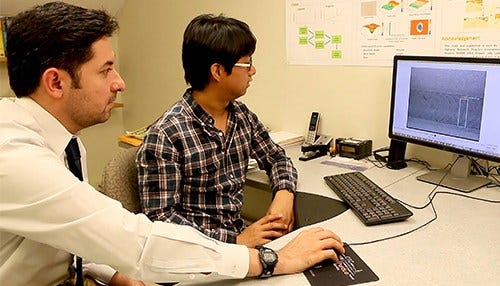Purdue Researchers Score Innovation Funding
 Mohammad Jahanshahi (left) is one of the recipients. (photo courtesy Purdue University)
Mohammad Jahanshahi (left) is one of the recipients. (photo courtesy Purdue University)
Subscriber Benefit
As a subscriber you can listen to articles at work, in the car, or while you work out. Subscribe NowThe Purdue Research Foundation has awarded a total of $105,000 to four researchers through its Trask Innovation Fund. The university says the researchers will use the funds to further develop their technologies, ranging from cool pads for hogs to converting plastic waste into clean fuels.
The Trask Innovation Fund awards funding twice a year to faculty and staff at Purdue to help support short-term projects that will help bring their innovations to commercialization. The recipients from this round of funding include:
Mohammad Jahanshahi – Assistant Professor in the Lyles School of Civil Engineering
- Received $40,835 for CRAQ, or Crack Recognition and Quantification, software. The technology detects cracks in steel components for nuclear power plants and numerous other infrastructures, including sewer pipelines, roads, bridges, wind turbines and dams. The system assists the periodic inspections in the nuclear power plant that ensure safe operations.
Linda Wang – Maxine Spencer Nichols Professor of Chemical Engineering
- Received $25,000 for “New Technologies for Converting Polyolefin Plastic Waste into Pristine Polymers or Clean Fuels." The technology converts plastic waste into clean fuel or other useful products. The conversion would reduce the waste stock in the United States while also increasing the recycling industry’s economic impact.
You-Yeon Won, Professor of Chemical Engineering,
- Received $20,000 for “Development of Radiation-Controlled Chemotherapeutic Release Formulations for Intratumoral Chemo-Radio Combination Therapy for Locally Advanced Tumors." He has developed a radiation-controlled drug-release formulation that improves the treatment of locally advanced tumors more effectively for some of the 60,000 people diagnosed with head and neck cancer a year in the United States. The formulation allows toxicity and side effects associated with radiation from chemotherapy to be minimized by co-encapsulating the drug within protective capsules and injecting the solution into the patient’s tumor before receiving normal radiotherapy.
Robert Stwalley, Assistant Professor of Agricultural and Biological Engineering
- Received $20,000 for “Hog Cooling Panel Control Package Upgrade." The technology, which is a cooling pad for sows, uses aluminum tread plates on top of copper pipes that circulate water. The cooling pad reduces body temperature, which is important for sows with large litters, as higher body temperatures will decrease the amount of milk production.
